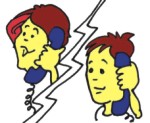| Learner's Club
Sorry to interrupt you, but .......
In our everyday conversation we often need to express our regrets or apologies or complaints as much as we need to express our appreciation and good wishes. Today we will discuss some of the ways in which we can express apologies and complaints.
A. Jolly and Anis had been invited by Simon and his wife for dinner at 7.30 at the Simons' house. They started from home in good time, but the traffic on the road was terrible and when they reached the Simons' place, it was almost 8.30. Mrs. Simon, after waiting for Jolly and Anis for some time, had just served food on the table.
Anis : Sorry, we're late. We were held up in the traffic jam for almost an hour.
Mr. Simon : Don't worry, glad you could come. |
|
 |
B. While having dinner, Jolly accidentally tipped the glass over and water spilled out on the table cloth. Jolly is embarrassed and apologises to the person sitting next to her.
Jolly : Oh, I'm awfully sorry! How clumsy of me!
Guest : That's quite all right. These things happen. |
C. Lily and Habib were waiting on the ground floor of the hospital for the lift. They didn't know each other. As the lift came, they tried to get in hurriedly and collided with each other.
Lily : Oh, I'm sorry!
Habib : Excuse me. My fault.
Lily : Not at all. |
|
Notice that 'Excuse me' here has been used not to draw Lily's attention, but to express apology, i.e. to mean 'pardon me.' Remember that in America, people do not say 'lift', they say 'elevator'. The word 'lift' in English can be used to mean something different, too.
For example,
Could you please give me a lift to the airport?'
That means, you are requesting someone to reach you to the airport. You can also use the word 'ride' in place of 'lift'.
For example, you could say, 'Could you please give me a ride to the airport?'
 |
D. Lily and Anil made arrangements to meet in front of the Museum at 5.00 p.m. Lily came
ten minutes late and see how she said 'sorry'.
Lily : Hello, Anil. Sorry to keep you waiting. It was difficult getting a rickshaw,
no one wanted to come this way.
Anil : That's okay. Come, let's go and sit there. |
In the same way, if we call somebody late in the evening, we can politely say, 'Sorry to call you so late', or in a more informal situation, 'Sorry to bother you, but ...'
Or, suppose two people are talking, but you need to say something urgent to one of them.
How can you in a polite way get into their conversation? Look at the following dialogue.
: Sorry to interrupt you.
: That's all right.
: Have you heard the news? ....
E. To express regrets we sometimes use the expression 'I'm afraid' and sometimes we say, ' I'm sorry'. For example,
Selina : Ann, do you know Sara's phone number?
Ann : I'm afraid I don't, Selina.
Selina : Any idea who might know? I've got to give her a message.
Ann : You can ask Jim. He's often seen with her.
Selina : That's a good idea, thanks.
Ann : Sorry, I couldn't help you more. |
 |

|
F. Sajed Ali is calling his friend Aziz Ahmed at his office. Mr. Ahmed's secretary answers
the phone.
Secretary : Good morning. Mr. Ahmed's office.
Sajed Ali : Morning. This is Ali here. Could I speak to Mr. Ahmed, please?
Secretary : I'm afraid Mr. Ahmed is not in the office right now, Mr. Ali.
Could I take a message?
Sajed Ali : No, thanks. I'll call later.
Almost two hours later.
Ali : Hello, this is Ali again. Is Aziz in?
Secretary : Sorry, Sir. Mr. Ahmed hasn't come back yet.
Ali : Could you please tell him to call me when he comes in?
Secretary : Certainly. I will.
Ali : Thanks. |
Note that in both the conversations (E and F), the secretary is first using 'I'm afraid' and then, 'I'm sorry'. In conversation E, Ann at the very outset gives the important piece of information to Selina that she doesn't know Sara's number. The next, 'Sorry, I couldn't help you more' is just a repetition of the same information.
Same is the case when she apologises to Mr. Ali and says that Mr. Ahmed is not in his office, and after a while apologises for the same reason that Mr. Ahmed hasn't yet come back.
Following are some examples of situations where our apologies cannot be always accepted without reservation.
G. Jamil always comes late to his English class. Today he has again come to class almost fifteen minutes late. Jamil : May I come in, sir?
Teacher : You're late again.
Jamil : I'm sorry, sir.
Teacher : It won't do, I'm afraid. |
 |
In this case, just saying 'sorry' doesn't really express the sincerity of Jamil's apology. The teacher, therefore, says, 'It won't do' meaning, 'Just saying sorry isn't good enough.'
Here is another example,
 |
H. For the last few months, you have been regularly getting mistaken telephone bills with wrong listing of calls made. You have already made complaints a few times. When again you get a bill with same kind of mistakes, you go to the telephone office and talk to an officer there. You : You have overcharged me again.
Officer : (After checking) We're awfully sorry, sir. We'll correct it right away.
You : I'm afraid 'sorry' won't do. I want to talk to your General Manager. |
Besides expressing apology, we can use 'sorry' while making complaints.
I. Rashids and Ahmeds are neighbours. Almost every evening a lot of people come to Mr. Rashid's house and they make lots of noise throughout the evening. This evening Mr. Ahmed gets very annoyed and goes over to his neighbour's house: Ahmed : I'm sorry to say this, but you've been making too much noise lately.
Rashid : I'm sorry. We didn't realise. I'll try to keep it down.
|
 |
| |
J. We can also make a complaint sound less rude by starting with 'I don't like to mention it, but ...'.Mr. Hasan : I don't like to mention it, but your secretary was rather rude to me just now.
Ms. Karim : Sorry to hear that. I'll take care of it. |
Copyright
(R) thedailystar.net 2006 |
|
